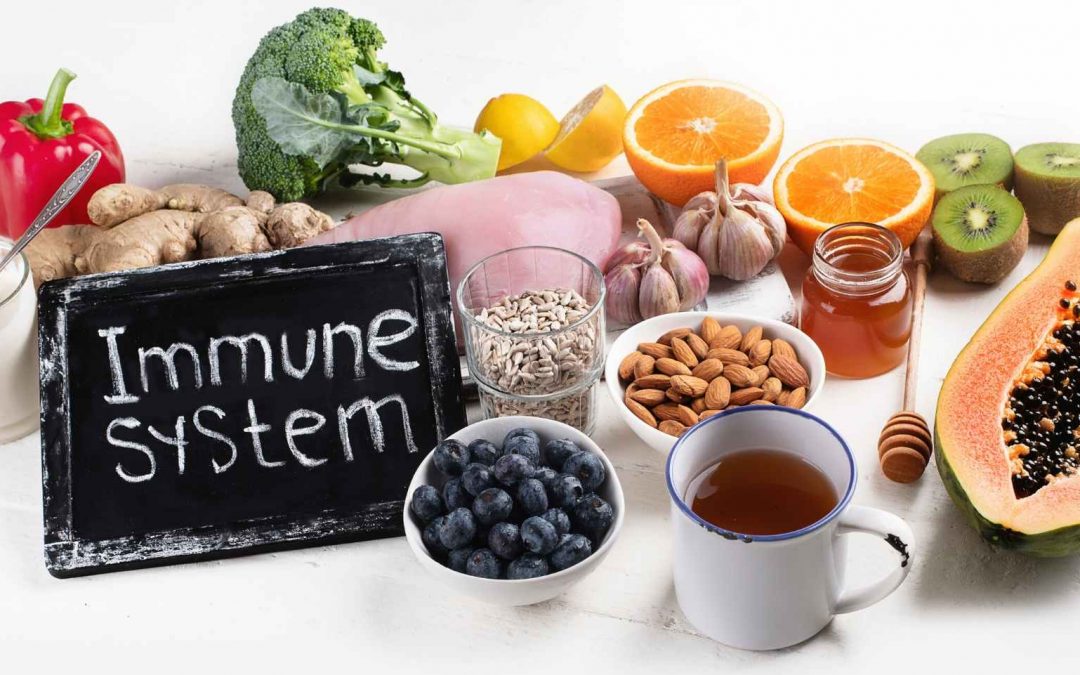Vitamin C, also known as ascorbic acid, is a vital nutrient that plays a significant role in maintaining a healthy immune system. This powerful antioxidant helps protect cells from damage, supports the production of collagen, aids in the absorption of iron, and enhances the body’s defense mechanisms against infections and diseases. In this comprehensive guide, we will explore the myriad benefits of Vitamin C for your immune system, how to incorporate it into your diet, and answer some frequently asked questions.
Understanding Vitamin C
What is Vitamin C?
Vitamin C is a water-soluble vitamin found in various fruits and vegetables. Unlike fat-soluble vitamins, it cannot be stored in the body, so regular consumption through diet or supplements is necessary. This essential nutrient is crucial for various bodily functions, including the synthesis of collagen, neurotransmitter production, and immune system support.
The Role of Vitamin C in the Body
Vitamin C serves several vital functions in the body:
- Antioxidant Protection: Vitamin C is a potent antioxidant that helps neutralize free radicals, unstable molecules that can cause oxidative stress and damage cells.
- Collagen Production: It is essential for synthesizing collagen, a protein that supports skin, cartilage, tendons, ligaments, and blood vessels.
- Iron Absorption: Vitamin C enhances the absorption of non-heme iron, the type of iron found in plant-based foods.
- Immune Support: It boosts the production and function of white blood cells, which are crucial for fighting infections.
The Immune-Boosting Power of Vitamin C
Enhancing White Blood Cell Function
White blood cells, or leukocytes, are the body’s primary defense against infections. Vitamin C enhances the function of various types of white blood cells:
- Neutrophils: These cells engulf and destroy pathogens. Vitamin C promotes the oxidative burst, a rapid release of reactive oxygen species used by neutrophils to kill microbes.
- Lymphocytes: These cells are vital for adaptive immunity. Vitamin C supports their proliferation and function, ensuring a robust immune response.
- Phagocytes: These cells consume harmful bacteria and other pathogens. Vitamin C improves their mobility and efficiency.
Supporting Skin Barrier Function
The skin is the body’s first line of defense against pathogens. Vitamin C is essential for maintaining the integrity and function of the skin barrier:
- Collagen Synthesis: As a key player in collagen production, Vitamin C helps maintain the structural integrity of the skin.
- Antioxidant Defense: It protects skin cells from damage caused by UV radiation and environmental pollutants.
- Wound Healing: Vitamin C accelerates the healing process by promoting collagen formation and reducing inflammation.
Reducing Inflammation
Chronic inflammation can weaken the immune system and contribute to various diseases. Vitamin C has anti-inflammatory properties that help modulate the immune response:
- Inhibiting Inflammatory Molecules: Vitamin C reduces the production of pro-inflammatory cytokines, proteins that promote inflammation.
- Enhancing Antioxidant Defense: By neutralizing free radicals, Vitamin C reduces oxidative stress, a major driver of inflammation.
Boosting Antioxidant Levels
Vitamin C is a powerful antioxidant that works synergistically with other antioxidants to protect cells from damage:
- Regenerating Vitamin E: Vitamin C regenerates oxidized Vitamin E, restoring its antioxidant function.
- Protecting Cellular Components: It protects DNA, proteins, and lipids from oxidative damage, preserving cellular health.
Incorporating Vitamin C into Your Diet
Vitamin C-Rich Foods
A diet rich in fruits and vegetables ensures adequate Vitamin C intake. Some excellent sources include:
- Citrus Fruits: Oranges, lemons, limes, and grapefruits are well-known for their high Vitamin C content.
- Berries: Strawberries, raspberries, blueberries, and blackberries are rich in Vitamin C and other antioxidants.
- Cruciferous Vegetables: Broccoli, Brussels sprouts, and cauliflower are excellent sources of Vitamin C.
- Leafy Greens: Spinach, kale, and Swiss chard provide a good amount of Vitamin C.
- Other Fruits and Vegetables: Kiwi, papaya, pineapple, mango, bell peppers, and tomatoes are also high in Vitamin C.
Tips for Maximizing Vitamin C Intake
- Eat Fresh: Fresh fruits and vegetables generally have higher Vitamin C levels than cooked or processed ones.
- Minimize Cooking Time: Prolonged cooking can degrade Vitamin C. Steaming or microwaving can help preserve its content.
- Store Properly: Store fruits and vegetables in a cool, dark place to prevent Vitamin C degradation.
- Include a Variety: A diverse diet ensures a broad intake of nutrients, including Vitamin C.
Supplementing with Vitamin C
If dietary intake is insufficient, Vitamin C supplements can help meet your needs:
- Forms of Supplements: Vitamin C supplements come in various forms, including ascorbic acid, sodium ascorbate, and calcium ascorbate.
- Dosage Recommendations: The recommended daily allowance (RDA) for Vitamin C is 90 mg for men and 75 mg for women. Higher doses may be beneficial for immune support, but consult a healthcare provider before taking large amounts.
- Choosing a Supplement: Look for reputable brands and consider supplements with bioflavonoids, which enhance Vitamin C absorption and effectiveness.
FAQs
What are the signs of Vitamin C deficiency?
Vitamin C deficiency can lead to several symptoms, including:
- Fatigue and Weakness: A lack of Vitamin C can cause general tiredness and reduced energy levels.
- Frequent Infections: Impaired immune function can increase susceptibility to infections.
- Gum Disease: Bleeding gums and gingivitis are common signs of deficiency.
- Slow Wound Healing: Vitamin C is essential for collagen production, which is crucial for wound healing.
- Dry, Rough Skin: Insufficient Vitamin C can lead to dry and scaly skin due to impaired collagen synthesis.
Can you take too much Vitamin C?
While Vitamin C is generally safe, excessive intake can cause side effects:
- Gastrointestinal Issues: High doses of Vitamin C (above 2,000 mg/day) can cause diarrhea, nausea, and abdominal cramps.
- Kidney Stones: Large doses may increase the risk of kidney stones in susceptible individuals.
- Iron Overload: High Vitamin C intake can enhance iron absorption, potentially leading to iron overload in people with certain conditions.
How does Vitamin C support the immune system during illness?
Vitamin C can help reduce the severity and duration of illnesses:
- Enhancing Immune Response: It boosts the function of white blood cells, enhancing the body’s ability to fight infections.
- Reducing Inflammation: Vitamin C’s anti-inflammatory properties can help alleviate symptoms of illness.
- Shortening Duration: Studies have shown that Vitamin C can reduce the duration of colds and other infections.
Is Vitamin C effective in preventing the common cold?
Vitamin C may help reduce the frequency and severity of colds:
- Prevention: Regular Vitamin C supplementation can slightly reduce the risk of catching a cold, particularly in individuals under physical stress (e.g., athletes).
- Severity and Duration: For those who do catch a cold, Vitamin C can shorten the duration and lessen the severity of symptoms.
Are there any interactions between Vitamin C and medications?
Vitamin C can interact with certain medications:
- Chemotherapy Drugs: High doses of Vitamin C may interfere with the effectiveness of some chemotherapy treatments.
- Statins and Niacin: Vitamin C may reduce the effectiveness of cholesterol-lowering drugs.
- Blood Thinners: Large doses of Vitamin C can affect the action of blood-thinning medications like warfarin.
How can I ensure I’m getting enough Vitamin C?
To ensure adequate Vitamin C intake:
- Eat a Balanced Diet: Include a variety of Vitamin C-rich fruits and vegetables in your daily meals.
- Consider Supplements: If dietary intake is insufficient, consider a Vitamin C supplement, especially during cold and flu season.
- Monitor Intake: Be mindful of your daily intake to avoid both deficiency and excessive consumption.
Is it better to get Vitamin C from food or supplements?
Both sources have their advantages:
- Food Sources: Obtaining Vitamin C from food provides additional nutrients and fiber that supplements lack.
- Supplements: Supplements can ensure adequate intake, especially for individuals with dietary restrictions or increased needs.
Can Vitamin C improve skin health?
Yes, Vitamin C can significantly benefit skin health:
- Collagen Production: It supports collagen synthesis, which is essential for skin elasticity and firmness.
- Antioxidant Protection: Vitamin C protects the skin from oxidative damage caused by UV radiation and pollution.
- Brightening Effect: It can help reduce hyperpigmentation and brighten the complexion.
What are the best sources of Vitamin C for vegetarians and vegans?
Vegetarians and vegans can obtain ample Vitamin C from plant-based sources:
- Fruits: Citrus fruits, berries, kiwi, papaya, pineapple, and mango.
- Vegetables: Bell peppers, broccoli, Brussels sprouts, cauliflower, and leafy greens.
How does Vitamin C interact with other vitamins and minerals?
Vitamin C works synergistically with other nutrients:
- Vitamin E: It regenerates oxidized Vitamin E, enhancing its antioxidant properties.
- Iron: Vitamin C improves the absorption of non-heme iron from plant-based foods.
- B Vitamins: It supports the function of B vitamins in energy production and metabolism.
Conclusion
Vitamin C is an essential nutrient that plays a crucial role in supporting a healthy immune system. By enhancing white blood cell function, maintaining skin barrier integrity, reducing inflammation, and boosting antioxidant levels, Vitamin C provides comprehensive immune support. Incorporating Vitamin C-rich foods into your diet, along with considering supplements if necessary, can help ensure you receive adequate amounts of this vital nutrient. Remember to consult with a healthcare provider before making
- Sculptra Surrey – Collagen Stimulation Therapy Near Fetcham, Surrey - June 1, 2025
- Xela Rederm Skin Booster Treatments Near Beddington, Surrey - June 1, 2025
- Profhilo Treatment Near Morden, Surrey - May 31, 2025

